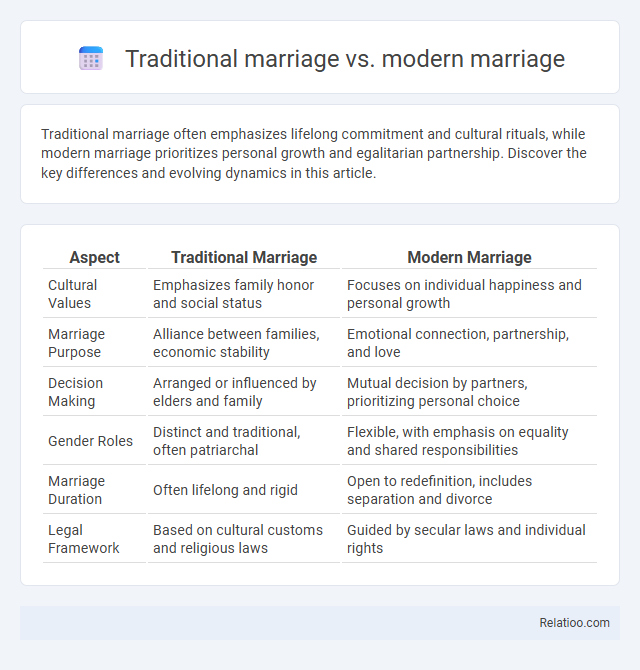Traditional marriage often emphasizes lifelong commitment and cultural rituals, while modern marriage prioritizes personal growth and egalitarian partnership. Discover the key differences and evolving dynamics in this article.
Table of Comparison
| Aspect | Traditional Marriage | Modern Marriage |
|---|---|---|
| Cultural Values | Emphasizes family honor and social status | Focuses on individual happiness and personal growth |
| Marriage Purpose | Alliance between families, economic stability | Emotional connection, partnership, and love |
| Decision Making | Arranged or influenced by elders and family | Mutual decision by partners, prioritizing personal choice |
| Gender Roles | Distinct and traditional, often patriarchal | Flexible, with emphasis on equality and shared responsibilities |
| Marriage Duration | Often lifelong and rigid | Open to redefinition, includes separation and divorce |
| Legal Framework | Based on cultural customs and religious laws | Guided by secular laws and individual rights |
Defining Traditional and Modern Marriage
Traditional marriage centers on culturally rooted ceremonies and roles often emphasizing religious or communal customs, while modern marriage prioritizes equality, personal choice, and flexibility in partnership definitions. Traditional marriages frequently involve arranged partnerships governed by longstanding societal norms, contrasting with modern marriages that focus on mutual consent and individual fulfillment. Marriage contracts legally formalize agreements between spouses, safeguarding rights and responsibilities regardless of the marriage style.
Historical Evolution of Marriage
Traditional marriage has its roots in culturally defined roles, often emphasizing family alliances, property exchange, and religious customs that shaped social structures for centuries. Modern marriage reflects evolving values such as individual choice, gender equality, and legal recognition of diverse partnerships, driven by social movements and legislative reforms since the 20th century. Marriage contracts, historically linked to dowries and property rights, have transformed into detailed legal agreements that clarify financial responsibilities and protect individual assets in contemporary unions.
Key Values in Traditional Marriage
Traditional marriage emphasizes enduring values such as commitment, family honor, and cultural rituals that strengthen community bonds. In contrast, modern marriage prioritizes equality, personal fulfillment, and adaptability within the partnership. Marriage contracts legally outline mutual rights and responsibilities, providing clarity and protection in both traditional and contemporary contexts.
Individual Autonomy in Modern Marriage
Modern marriage emphasizes individual autonomy by allowing partners to negotiate roles, responsibilities, and rights freely, contrasting with traditional marriage's fixed, culturally prescribed expectations. Traditional marriage often enforces collective decision-making and adherence to family or societal norms, limiting personal freedoms. Marriage contracts provide a legal framework that further safeguards individual interests and autonomy, enabling customization of the marital relationship in ways that traditional models typically do not permit.
Gender Roles: Tradition vs Modernity
Traditional marriage often reinforces rigid gender roles, with men typically positioned as providers and women as caregivers, reflecting longstanding cultural norms. Modern marriage challenges these conventions by promoting gender equality, shared responsibilities, and mutual decision-making between partners regardless of traditional expectations. Marriage contracts serve as legal frameworks that can explicitly define roles and responsibilities, offering flexibility to tailor commitments in line with either traditional values or modern egalitarian principles.
Impact of Technology on Modern Marriages
Technology has revolutionized modern marriages by facilitating communication through digital platforms, enabling long-distance relationships to thrive and allowing couples to share experiences in real-time despite physical separation. Traditional marriages often rely on face-to-face interactions and cultural rituals, whereas modern marriages leverage virtual tools like social media, dating apps, and online counseling to enhance connectivity and conflict resolution. Marriage contracts have also evolved with technology, incorporating digital signatures and blockchain for secure, transparent agreements, reflecting the shift towards legal modernization in matrimonial commitments.
Family and Community Influence
Traditional marriage often involves strong family and community influence, with arranged unions and collective decision-making reinforcing social bonds and cultural continuity. Modern marriage tends to prioritize individual choice and romantic love, reflecting a shift toward personal autonomy and self-fulfillment within a less rigid community framework. Marriage contracts legally formalize mutual obligations, offering flexibility and protection tailored to the couple's needs while sometimes balancing traditional expectations with modern legal standards.
Legal and Social Changes in Marriage
Traditional marriage, rooted in longstanding cultural and religious customs, often emphasizes lifelong commitment with legally binding ceremonies that prioritize family alliances and inheritance rights. Modern marriage reflects evolving social norms, incorporating gender equality, cohabitation acceptance, and diverse partnership types, leading to legal reforms in spousal rights, divorce laws, and child custody arrangements. Marriage contracts, or prenuptial agreements, have gained prominence as legal tools that clearly define asset distribution, financial responsibilities, and personal rights, adapting to contemporary societal expectations and protecting individual interests within marital relationships.
Challenges and Benefits of Each Model
Traditional marriage often faces challenges such as rigid gender roles and societal expectations, yet it benefits from strong cultural and familial support systems that foster stability. Modern marriage emphasizes equality and individuality, which can lead to greater personal fulfillment but may struggle with balancing work-life demands and shifting social norms. Marriage contracts offer flexibility by clearly defining financial and legal terms, reducing conflicts but potentially undermining emotional trust and the perception of lifelong commitment.
Future Trends in Marriage Dynamics
Future trends in marriage dynamics highlight a shifting landscape where traditional marriage often emphasizes lifelong commitment and cultural rituals, while modern marriage prioritizes equality, personal growth, and flexibility. Marriage contracts are increasingly being adopted to clearly outline financial and legal responsibilities, offering couples protection and clarity in an evolving social context. Your awareness of these trends can help navigate the complexities of commitment, ensuring a balanced approach that respects personal values and legal safeguards.

Infographic: Traditional marriage vs Modern marriage
 relatioo.com
relatioo.com